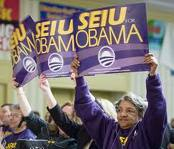Will Team Biden Weaponize Workers’ Pensions?
Big Labor abuse of worker pension and benefit funds as a means of advancing union bosses’ self-aggrandizing policy objectives is a familiar phenomenon.
 Trying to increase the number of workers who are forced to pay union dues as a condition of employment is perhaps the TOP priority for President Obama at the moment. Michael Barone takes the president to task for his consistent refusal to say no to the union bosses. Here is his rundown:
Trying to increase the number of workers who are forced to pay union dues as a condition of employment is perhaps the TOP priority for President Obama at the moment. Michael Barone takes the president to task for his consistent refusal to say no to the union bosses. Here is his rundown:
[Obama] certainly can demonstrate that he cares about certain jobs — the 7 percent of private-sector jobs and 36 percent of public-sector jobs held by union members.
During his two years and nine months as president, he has worked time and again to increase the number of unionized jobs.
Some pro-union moves have a certain ritual quality. Democratic presidents on taking office seek to strengthen federal employee unions.
Fully one-third of the $820 billion stimulus package passed almost entirely with Democratic votes in 2009 was aid to state and local governments. This was intended to keep state and local public employee union members — much more numerous than federal employees — on the job and to keep taxpayer-funded union dues pouring into public employee union treasuries.
In arranging the Chrysler bankruptcy, the Obama White House muscled aside the secured creditors who ordinarily have priority in bankruptcy proceedings in favor of United Auto Workers [union].
That’s an episode that I labeled “gangster government.” Former Obama economic adviser Lawrence Summers protested that his White House colleague Ron Bloom had made similar arrangements before. But in those cases Bloom was working for the unions, not for a supposedly neutral government.
The 2009 stimulus package also contained Davis-Bacon law provisions requiring that construction workers be paid “prevailing wages,” … That means the public pays a premium for government construction.
[A]ppointed pro-union stalwarts to the board supervising airline industry unionization elections. That board changed long-standing rules on what counts as a majority in an attempt to get unions approved at mostly nonunion Delta after it absorbed mostly unionized Northwest. The problem is that the employees kept voting against unionization anyway.
Obama has called for doubling American exports over the next five years. But when America’s No. 1 exporter, Boeing, built a $1 billion Dreamliner plant in South Carolina, Obama’s appointee as general counsel of the National Labor Relations Board brought a case to force it to shut down.
The theory is that Boeing needs to build the airliner in pro-union Washington state rather than in South Carolina, whose right-to-work law bars requiring employees to join unions. Maximizing union membership evidently comes first, before all other goals.
Obama’s partiality to unions is apparently rooted in a conviction that we would be better off if every employee were represented by a union.
The marketplace says otherwise. Private-sector unionism has produced the General Motors and Chrysler bankruptcies, while states with strong public-sector unions, according to a Harvard study, have to pay higher interest rates to borrow money.
But unions do have one positive characteristic from Obama’s point of view: They funnel taxpayers’ or consumers’ money to the Democratic Party — $400 million in 2008. So they get one payoff after another in return.

Big Labor abuse of worker pension and benefit funds as a means of advancing union bosses’ self-aggrandizing policy objectives is a familiar phenomenon.

What impact does handing a union monopoly power to deal with your employer on matters concerning your pay, benefits, and work rules have on your pay?

Wherever Big Labor wields the power to collect forced union dues, union bosses funnel a large share of the confiscated money into efforts to elect and reelect business-bashing politicians. Employment growth tends to lag as a consequence.